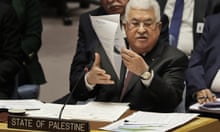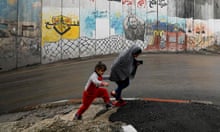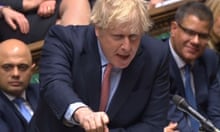Donald Trump’s Middle East peace plan could make the creation of a viable Palestinian state much less likely, despite the US president heralding it as a “realistic two-state solution”, diplomats, analysts and aid organisations have warned.
But even before the ink was dry on a plan largely credited to Trump’s son-in-law, Jared Kushner, analysts from both right and left in Israel, as well as elsewhere, were questioning both the workability of its practical proposals and whether what it described amounted to any kind of Palestinian sovereignty, let alone a viable state.
The immediate official response of many governments were guarded statements, like that issued by France’s Ministry of Foreign Affairs, which noted that France would “carefully study” the US proposals.
Boris Johnson, the UK prime minister, was perhaps the most enthusiastic of European leaders, with his official spokesman saying: “What the PM has said, and the foreign secretary as well, is that they are serious proposals for peace and that they therefore deserve a fair hearing.”
Q&AWhat is in Donald Trump's Middle East peace plan?
Show
Donald Trump has unveiled his much-touted Middle East peace plan, tweeting a map showing his vision for an even further depleted Palestinian state than that envisioned by the Oslo peace agreement in 1993.
The key points of the proposed plan are:
- Establish Jerusalem as Israel’s “undivided” capital, with a potential Palestinian capital to the east and north of the city.
- Recognise the vast majority of Israeli settlements on occupied Palestinian territory as part of the country. A Palestinian state would receive territory, mostly desert, near Gaza to compensate for the loss of about 30% of the West Bank. Gaza and the West Bank would be linked by high speed rail.
- Recognise the Jordan valley, which makes up about a third of the occupied West Bank, as part of Israel.
- Offer a path to some form of Palestinian statehood but with no army, and overarching Israeli security control in some areas, including over the sea. The plan also sets a series of conditions the Palestinians have to meet before receiving independence including the “complete dismantling of Hamas”, which governs Gaza.
- The possibility of stripping Israeli citizenship from tens of thousands of Arab Israelis who live in 10 border towns, with those towns and their residents being included into any future state of Palestine.
- Recognise sections of the desert bordering Egypt as part of any future Palestinian state.
- Refuse Palestinian refugees the “right of return” to homes lost to Israel in previous conflicts.
Behind the scenes, EU countries were also concerned over how to react should Israel take the plan as a green light to annex illegal settlements on the West Bank which Trump has suggested should be recognised as under Israeli sovereignty.
“There is an EU position we have expressed previously stressing opposition to annexation and consequences if they do so,” one European diplomat said. “But it is fair to say there is no consensus on what those consequences could be.”
For his part, the UN secretary general, António Guterres, issued a terse but polite rejection, that echoed the French statement pointing out that while he had “seen the announcement … the position of the United Nations on the two-state solution has been defined, throughout the years, by relevant security council and general assembly resolutions by which the secretariat is bound.”
More heated language, was used by Turkish President Recep Tayyip Erdoğan who described the plan as “absolutely unacceptable” ignoring Palestinians’ rights while “legitimising Israel’s occupation”. “The plan outlined,” he added, “will not serve peace or bring about a solution.”
Many Arab countries, in contrast, have tried to hedge their bets despite reservations, anxious not to alienate Trump.
Ahmed Abd Rabou, a visiting assistant professor at the Josef Korbel School of International Studies at the University of Denver, described the responses of Riyadh and Cairo as “very conservative”.
“They simply didn’t want to upset Trump whom they ally with, but they can’t upset the general public as well, so they decided to go for a middle-ground solution,” he said, adding that the statements implied they disagree with many parts of the plan.
Hugh Lovatt, a policy fellow at the European Council on Foreign Relations, offered a scathing analysis.
“Despite its appropriation of the two-state label, the United States is not offering Israelis and Palestinians a viable and peaceful future in their own states. Instead, its proposal would cement a one-state reality of open-ended occupation and unequal rights for Palestinians.
“The plan leaves Palestinians with an atrophied entity made up of disconnected Bantustans in the West Bank and Gaza … devoid of meaningful sovereignty, lacking any control over its borders, airspace, territorial waters, and the bulk of its natural resources – and with no capital in East Jerusalem. Essentially, the deal represents a worsening of the current situation, with a US presidential seal of approval.”
Robert Malley, the president of the International Crisis Group, was not alone in seeing the “vision for peace” as a call for Palestinian surrender rather than realistic talks.
“Strip away the domestic and Israeli political considerations that determined the timing of the plan’s release,” he said “and the message to the Palestinians, boiled down to its essence, is: ’you’ve lost, get over it’.”
A joint statement from British NGOs, including Cafod, Christian Aid and War on Want, also questioned whether the plan, which Trump suggested could release $50bn in economic assistance to Palestinians, could have the reverse effect.
“There is a major risk that the so-called ‘peace plan’, set to be released imminently, will lead to the formal annexation of Palestinian land, perpetual Israeli occupation, and the negation of Palestinians’ collective right to self-determination. Such an outcome will only deepen poverty and polarisation.
“Formal annexation would also seriously breach a foundational principle of the post-second world war international legal order, with implications far beyond the Israel-Palestine context.
“Palestinians are already losing their land with creeping de-facto annexation of the West Bank, forcing them to become perpetually aid-dependent despite abundant natural resources.”
Israeli commentators from both left and right homed in on the many practical concerns raised by the Trump proposal. Writing in the left-leaning Israeli newspaper Haaretz, Amir Tibon said the deal would not bring about a Palestinian state in a meaningful sense.
“This future [Palestinian] state will have none of the actual characteristics of a state. The streets of all of its cities, towns and villages, as well as the roads connecting them, will be under the full control of the military of another state – Israel. It will have no control over its borders, which will also be controlled by Israel.”
Others, like the Jerusalem Post, focused on what the plan would mean in practical terms including Israel’s security.
“Although the concept foresees a contiguous Palestinian state, it is contiguity in name only. No other state in the world looks so gerrymandered. It is a state without an airport or real ports. It is a state that is inside another state and whose borders are basically controlled by Israel.”









